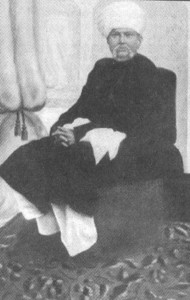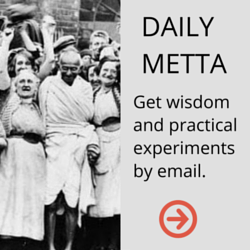February 21
 “Confession of an error is like a broom that sweeps away dirt and leaves the surface cleaner than before.”
“Confession of an error is like a broom that sweeps away dirt and leaves the surface cleaner than before.”
–Gandhi (Harijan, 2-16-1946)
(Gandhi’s father, Karamachand, pictured here)
When Gandhi was a boy he stole money to buy cigarettes. When he eventually realized that he was on the wrong path, young Mohandas decided that he would write a letter to his father to confess the entire ordeal. Thinking that he might be punished, he instead witnessed his father being so moved that tears of love were streaming down his cheeks. Gandhi carried this experience with him throughout his life, and one should not doubt that it influenced the way that he understood the dynamics of nonviolence, or what he called “truth-force.”
Making mistakes, erring, is how we learn and grow. Mistakes are not the problem. The issue is how we regard them. Our society does not do this well, and we could stand to learn from Gandhi: we generally consider those who commit them as bad people, and that we have to punish them. Who would want to confess something that condemns us to alienation and isolation; and yet, who is free from mistakes among us?
If we want to help pave the path toward nonviolence in our society, we have to change the way we view mistakes, and make it safe for people to confess them — and commit to not continuing to do them. It takes tremendous courage to do so. It is in hiding our errors that we continue to commit them and allow others to do so. If society saw mistakes as bad choices, instead of condemning people, we would help and support the person who made the mistake and re-direct them toward better choices.
Experiment in Nonviolence:
Are you willing to admit when you err? What hinders you from doing so? What steps might you take to be more willing to be honest with your mistakes?
 Daily Metta 2015, a service of the Metta Center for Nonviolence, is a daily reflection on the strategic and spiritual insights of Mahatma Gandhi in thought, word and deed. As Gandhi called his life an “experiment in truth,” we have included an experiment in nonviolence to accompany each Daily Metta. Check in every day for new inspiration. Each year will be dedicated to another wisdom teacher.
Daily Metta 2015, a service of the Metta Center for Nonviolence, is a daily reflection on the strategic and spiritual insights of Mahatma Gandhi in thought, word and deed. As Gandhi called his life an “experiment in truth,” we have included an experiment in nonviolence to accompany each Daily Metta. Check in every day for new inspiration. Each year will be dedicated to another wisdom teacher.








